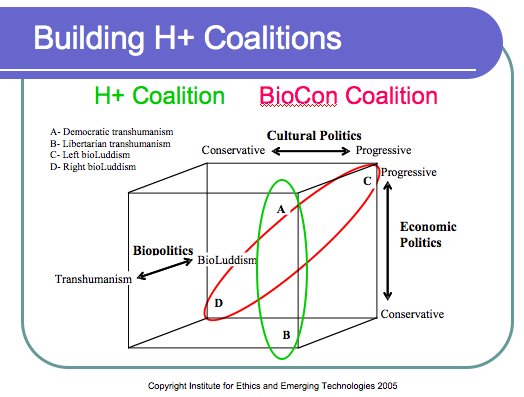Democratic Transhumanism
James Hughes, Ph.D.
page 8 of 8
Image 2 shows the current outline of the coalition that we are building within the WTA.

Image 2: Building H+ Coalitions (click image to enlarge)
Other groups may soon be involved and we will cross that bridge when we come to it. For a brief time, I was negotiating with conservative Baptist Republicans in Alabama, who thought that they were transhumanists and wanted to join the WTA. Eventually they decided otherwise and left, but they did consider it, so other diverse groups might someday follow in their footsteps.
In this struggle for the kind of polity that we want to create, we must rememeber that the problems in the world are not caused by technology. Technology can be inscribed by the kind of politics from which it emerges, but it can also be turned into emancipatory, liberatory uses. An example of the kind of thing that we want to see happening is the WorldChanging blog[1], where a number of environmentalists are gathering to argue, "Look, we've been too Luddite in the past about different kinds of appropriate technology, and we need to start embracing all the different technologies and see how they can build a sustainable technological path to the future."
We need to avoid both an anti- and pro- approach to technology, and understand that the problems in our world are really greed, racism, inequality, and superstition. I give the example of the cross bow, which was invented as a way for knights to shoot peasants from their horses, but turned out to be an even better way for peasants to shoot knights off their horses. Up until that point, if you tried as a peasant to get close to a knight, he would just whack you down easily with his sword, but you could pick him off from about a hundred yards away with a crossbow. Thus, crossbows are one example of many different kinds of technology that may be created under a particular kind of power context and may initially have an inegalitarian intention, but may have a very different result down the road.
Finally, to even those extreme libertarians, I argue that we need to devise policies that will make sure that people in places like Somalia have access to the same life-extension medicine, pills, vitamins and cybernetic implants that we richer countries will some day have. Even the most anti-regulatory folks must agree that shaping a polity that accommodates the haves and the have-nots equally with regard to these emerging technologies is a direction we must undertake.
 James Hughes teaches Health Policy at Trinity College in Hartford Connecticut, and serves as Trinity's Associate Director of Institutional Research and Planning. Dr. Hughes also serves as the Executive Director of the Institute for Ethics and Emerging Technologies and its affiliated World Transhumanist Association. Dr. Hughes produces the weekly syndicated public affairs talk show Changesurfer Radio, writes the Change Surfing column for Betterhumans.com, and contributes to the democratic transhumanist Cyborg Democracy blog. Dr. Hughes is the author of Citizen Cyborg: Why Democratic Societies Must Respond to the Redesigned Human of the Future.
James Hughes teaches Health Policy at Trinity College in Hartford Connecticut, and serves as Trinity's Associate Director of Institutional Research and Planning. Dr. Hughes also serves as the Executive Director of the Institute for Ethics and Emerging Technologies and its affiliated World Transhumanist Association. Dr. Hughes produces the weekly syndicated public affairs talk show Changesurfer Radio, writes the Change Surfing column for Betterhumans.com, and contributes to the democratic transhumanist Cyborg Democracy blog. Dr. Hughes is the author of Citizen Cyborg: Why Democratic Societies Must Respond to the Redesigned Human of the Future.
Footnotes
1. Worldchanging is a blog which covers environmental, humanitarian and design issues. http://en.wikipedia.org/wiki/Worldchanging March 23, 2006 5:28PM EST (back to top)